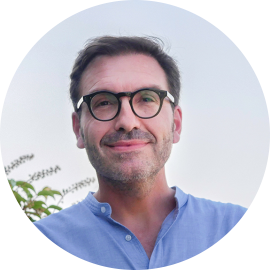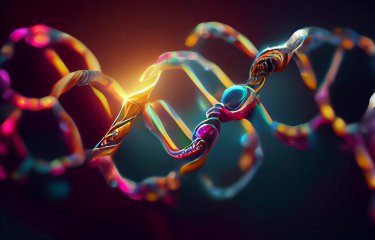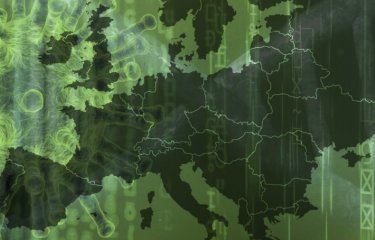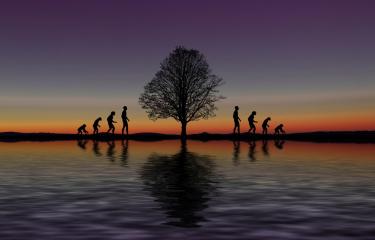Lluis Quintana-Murci is a scientist specializing in human genetics, with a particular focus on population genetics. His fascinating research tells an amazing story – our story, the story of humanity through time and in all its stunning diversity. Lluis was delighted to talk to us about his background and his passion for his work.
Lluis was born in 1970 in Palma de Mallorca in Spain. As a child, he remembers having a vivid imagination, spending his time daydreaming about traveling and discovering new places. When he became a teenager he even used to go to the airport just for the pleasure of hearing people arriving from all over the world speaking different languages. What he didn't know then was that this fascination with human diversity would stay with him and become the focal point of his career.
From island living to international travel
When Lluis was at high school, he dreamed of becoming a marine biologist. So when the time came to make a decision, he chose to study biology (specializing in microbiology), and set off from his home island to the University of Barcelona. After his initial studies he was keen to do a PhD, and since he still had the travel bug he enrolled at the University of Pavia in Italy. It was during his time in the Department of Genetics, and especially the Population Genetics School founded by the famous Luigi Luca Cavalli-Sforza, that Lluis hit upon the topic that would become his passion: studying the evolution and genetic diversity of human populations.
Tracing the origins of humanity
Lluis arrived at the Institut Pasteur in Paris in 1999, joining the Human Immunogenetics Unit led by Marc Fellous. That same year, he published his first findings on the routes taken by humans when they left Africa more than 60,000 years ago.(1)
In 2005, he obtained his accreditation to supervise research, giving him the opportunity to open his own unit, Human Evolutionary Genetics, in 2007.
Lluis already has more than 200 scientific publications to his name. His extensive research on genome diversity helps us understand how our species is able to adapt to its environment.(2) When humans migrated from Africa to other world regions, they underwent mutations over thousands of years to adapt to climatic differences, the nutritional resources available to them and the pathogens they came into contact with.
Lluis gives us a quick history lesson:

Lluis Quintana-Murci
In the broader context of the origins of life on Earth, our species is extremely recent; it is thought to have emerged around 200,000 years ago. So we are not very diversified in genetic terms – we all belong to one single species, Homo sapiens, though of course with genetic nuances that have developed as we have adapted to our environment.
Adaptation and immunity
These genetic differences also have an impact on our health and the way in which we deal with infectious agents. Studying the genetic heritage of individuals and human populations helps us to identify the genes that both enable us to survive viral or bacterial infections and also cause us to respond differently to therapeutic treatments.
"I am currently one of the coordinators of the "Milieu Intérieur" project, which looks at the different genetic, epigenetic, environmental and other factors involved in the variability of our immune system. The aim of this research is to pave the way for precision treatments, personalized medicine that can be adapted according to how we respond to a given treatment," he explains.
Lluis and his teams are involved in a number of national and international projects; their work touches on a wide variety of scientific disciplines ranging from geography, history and anthropology to genetics, immunology and even virology. His research has called into question the date of emergence of malaria in Africa,(3) demonstrated that the admixture of our ancestors with Neanderthal populations mainly affected their immune response to viruses,(4) and more recently pieced together the migratory routes taken by the Bantu peoples through Africa and revealed how they adapted to their environment.(5)
Lluis admits to being something of a "workaholic", explaining "I don't put up any boundaries between my work as a scientist and my free time – they are both part of my life, and it's a life that I enjoy very much! What drives me every day is being able to read, write and learn. I am so lucky to do the job that I do, as it gives me total freedom!"
For Lluis, who has acquired French citizenship, it is a real pleasure to live in Paris and to admire the Eiffel Tower every morning from his laboratory window.
(1) Genetic evidence of an early exit of Homo sapiens sapiens from Africa through eastern Africa – Nature Genetics, December 1999
(2) Natural selection has driven population differentiation in modern humans – Nature Genetics, March 2008
(3) Recent Adaptive Acquisition by African Rainforest Hunter-Gatherers of the Late Pleistocene Sickle-Cell Mutation Suggests Past Differences in Malaria Exposure, The American Journal of Human Genetics, February 2019
(4) Genetic Adaptation and Neandertal Admixture Shaped the Immune System of Human Populations. Cell, October 2016
(5) Dispersals and genetic adaptation of Bantu-speaking populations in Africa and North America. Science, May 2017
Key dates in Lluis’ career
1970: Born in Palma de Mallorca, Spain
1993: Master's in Biology (specializing in Microbiology) at the University of Barcelona
1994-1999: Thesis on "The variability of the Y chromosome and mitochondrial DNA in human populations", University of Pavia
1999: Post-doctoral fellow in the Human Immunogenetics Unit led by Marc Fellous at the Institut Pasteur
2005: Accreditation to supervise research (HDR) from Pierre & Marie Curie University
2007: Head of the Human Evolutionary Genetics Unit
2008: CNRS Bronze Medal
2013: CNRS Silver Medal
2014: Member of EMBO and Academia Europaea
2014: "Grand Prix Jean Hamburger" in Medicine and Biomedical Research awarded by the City of Paris
2015: Mergier-Bourdeix Prize awarded by the French Academy of Sciences
2016-2017: Scientific Director of the Institut Pasteur, Paris
2018: Gold Medal of the Balearic Islands





